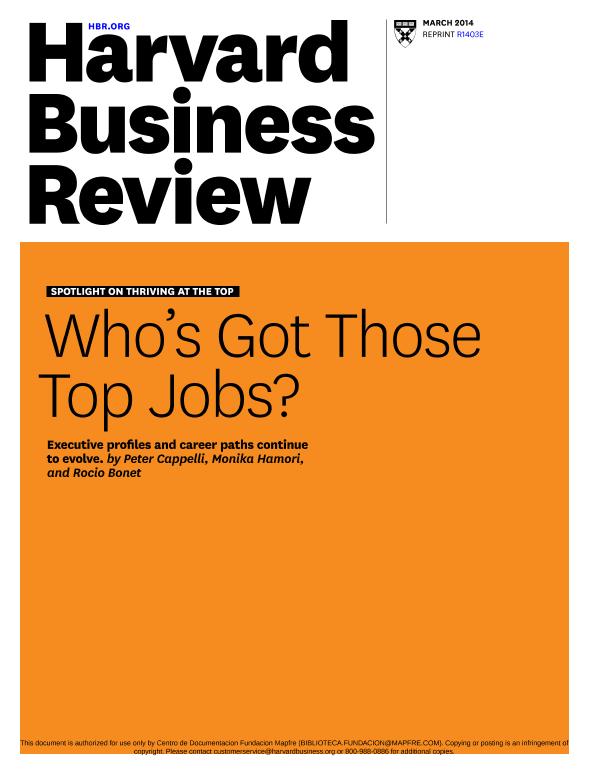Who's got those top jobs? : executives profiles and career paths continue to evolve

Contenido multimedia no disponible por derechos de autor o por acceso restringido. Contacte con la institución para más información.
| Tag | 1 | 2 | Value |
|---|---|---|---|
| LDR | 00000cab a2200000 4500 | ||
| 001 | MAP20140030491 | ||
| 003 | MAP | ||
| 005 | 20140903124219.0 | ||
| 008 | 140902e20140303esp|||p |0|||b|spa d | ||
| 040 | $aMAP$bspa$dMAP | ||
| 084 | $a922.12 | ||
| 100 | 1 | $0MAPA20080125967$aCappelli, Peter | |
| 245 | 1 | 0 | $aWho's got those top jobs?$b: executives profiles and career paths continue to evolve$cPeter Cappelli, Monika Hamori, Rocio Bonet |
| 520 | $aEach era has its own senior-executive profile. A century ago many of the largest, most powerful corporations were led by entrepreneursHenry Ford, for example, who had founded his automaker, and Alfred P. Sloan, whose company had been acquired by General Motors. By the 1920s professional managers were hopping from company to company to fill high-level management positions. By the 1950s lifelong employees of corporations were working their way up the ladder to claim the top jobs. The executive profile continues to evolve. In The New Road to the Top (HBR January 2005), two of us (Cappelli and Hamori) compared leaders in the top 10 roles at each of the Fortune 100 companies in 1980 with those in 2001, noting a sharp decline in the lifer model and a corresponding uptick in rapidly advancing young executives who spent less time with any one employer. Here we have extended our analysis to 2011. | ||
| 650 | 4 | $0MAPA20080574550$aAltos directivos | |
| 650 | 4 | $0MAPA20080580469$aÉxito profesional | |
| 650 | 4 | $0MAPA20080607647$aPerfiles profesionales | |
| 650 | 4 | $0MAPA20080603236$aPromoción profesional | |
| 650 | 4 | $0MAPA20080594657$aAnálisis demográfico | |
| 700 | 1 | $0MAPA20120018358$aHamori, Monika | |
| 700 | 1 | $0MAPA20140014071$aBonet, Rocío | |
| 773 | 0 | $wMAP20077100345$tHarvard business review$dBoston : Impact Media Comercial S.A., 1988-$g03/03/2014 Tomo 92 Número 3 - marzo 2014 , p. 75-79 |

